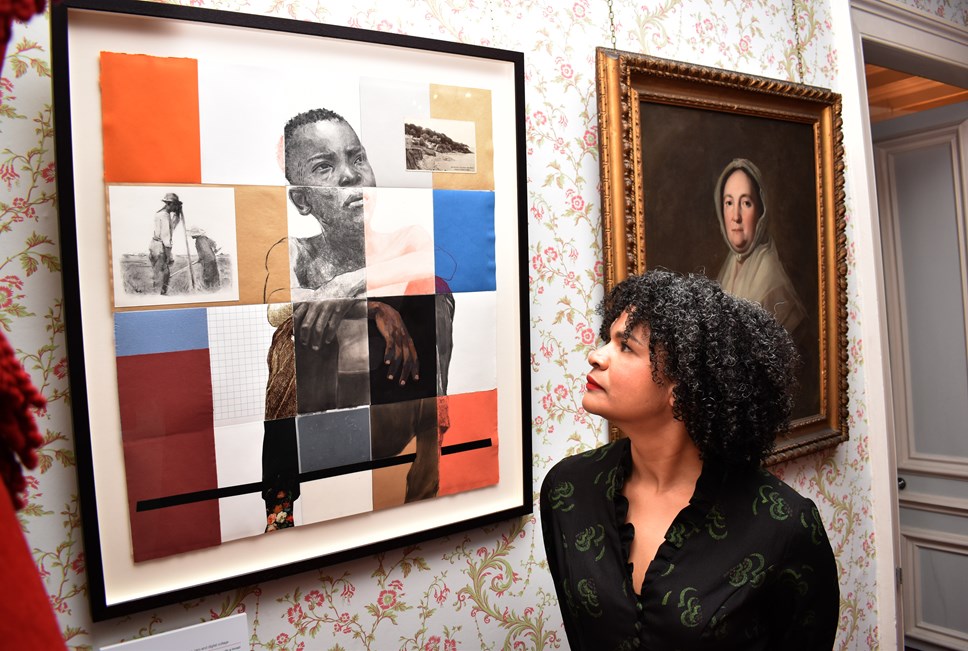
Facing the Past: Preston school children visit Judges' Lodgings Museum to mark Black History Month
School children from a Preston school were given a special tour from the artist behind a poignant exhibition at Judges' Lodgings Museum as part of Black History Month.
Facing the Past: Black Lancastrians – A Portrait exhibition by Lela Harris, shines a light on the lives of the enslaved Africans living in the area in the 1700s.
To mark Black History Month, children from St. Stephen's C.E. Primary School in Preston were given a tour of the powerful exhibition by Lela Harris, who used church records, runaway slave adverts and family stories to piece together a new narrative for the forgotten people who were enslaved in Lancaster.
Children learnt about the Black Lancastrians depicted in a series of striking portraits, which are shown alongside some of those who benefitted from slavery, and the creative process behind them.
They also visited the young peoples' exhibition, which features portraits created by local school children of ‘Ebo Boy’, a young African man who escaped from slavery in Heysham, Lancashire.
Another element of the project saw Judges' Lodgings Museum, Lela Harris and Lancaster Black History Group work with three local primary schools to run history and art workshops at the museum. This led the children to rename ‘Ebo Boy’, Afamefuna, to reflect his Igbo African heritage.
Lela Harris said:
"It was super inspiring to work with the young people from the local primary schools. We worked with over 120 young people on the project.
"It's fantastic to see the way they embraced the project and tried to bring the story of Afamefuna to life through their artwork.
"The name Afamefuna is from the Igbo culture and actually means 'my name will not be lost'.
"So, I think it's a great way of symbolising how invested the local community have been in telling the stories of these enslaved Africans who were brought to Lancaster."
The historic Black Lancastrians depicted in the exhibition lived at a time when Lancaster merchants invested in selling an estimated 30,000 enslaved Africans through the Atlantic Slave Trade.
In the 18th century, Lancaster was the fourth largest slave trading port in the country, with slave ships making 125 slaving voyages from the city to West Africa. Some of the furniture and portraits on display at the museum were bought by Lancaster families involved in the slave trade.
Lynda Jackson, manager of Judges' Lodgings Museum, said:
"I think it's really important for us to tell the whole story of Lancaster. A lot of the buildings that you see around you were part funded from the West Indies trade and the slave trade.
"So I think the story of Black history is a fundamental part of Lancaster's story.
"The exhibition has been really well received.
"We've had lots of school groups visits and we've had lots of great feedback and lot of emotional responses from visitors.
"Some people have been brought to tears looking at the new portraits and hearing the stories behind them."
Facing The Past is a collaboration between Lancaster Black History group, Judges' Lodgings Museum, The Institute For Black Atlantic Research at UCLan, Sociology at Lancaster University and local schools. It has been supported with £30,000 from the Art Fund and the Association of Independent Museums (AIM) and National Lottery Heritage Fund.
The Judges' Lodgings is also marking Black History Month with an event called 'Respect This Lonely Grave – Sambo's Grave and Creative Responses to Archival Silences'. The talk by poet Dr Robert Bullock is on Friday 13th October and repeated on Friday 3rd November. Booking required on judgeslodgings@lancashire.gov.uk and 01524 581241.
For more information visit: Judges' Lodgings Museum - Lancashire County Council
Notes to editors
Judges' Lodgings is a unique historic house and museum in the city of Lancaster – close to its famous castle. It is Lancaster's oldest town house and was once home to judges who worked in Lancaster Castle. It is now home to an extensive collection of Gillow furniture from beds to billiard tables. Gillow was a major British furniture maker in Lancaster for over 200 years. It is one of six museums operated by Lancashire County Museum Service which aims to collect and preserve Lancashire’s diverse heritage and to make it accessible to everyone through high quality cultural experiences. www.lancashire.gov.uk/museums
Art Fund is the national fundraising charity for art. It provides millions of pounds every year to help museums to acquire and share works of art across the UK, further the professional development of their curators, and inspire more people to visit and enjoy their public programmes. Art Fund is independently funded, supported by Art Partners, donors, trusts and foundations and the 135,000 members who buy the National Art Pass, who enjoy free or discounted entry to over 850 museums, galleries and historic places, 50% off major exhibitions, and receive Art Quarterly magazine. Art Fund also supports museums through its annual prize, Art Fund Museum of the Year. The winner of Art Fund Museum of the Year 2022 is Horniman Museums & Gardens. www.artfund.org
AIM is The Association of Independent Museums, a charity which supports museums in the UK. The New Stories New Audiences is a new grant scheme for AIM small museum members funded by National Lottery Heritage Fund. It aims to inspire museums to stay relevant to their audiences and to increase their impact by identifying new stories and by working with a new partner, to work differently and to try something new.
